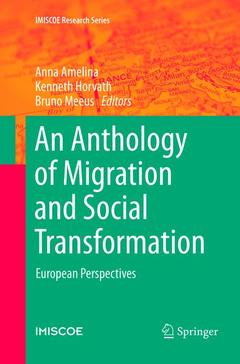Description
An Anthology of Migration and Social Transformation, Softcover reprint of the original 1st ed. 2016
European Perspectives
IMISCOE Research Series
Coordinators: Amelina Anna, Horvath Kenneth, Meeus Bruno
Language: English
Subjects for An Anthology of Migration and Social Transformation:
Publication date: 03-2019
361 p. · 15.5x23.5 cm · Paperback
Publication date: 12-2015
Support: Print on demand
Description
/li>Contents
/li>Comment
/li>
The contributions of this book examine contemporary dynamics of migration and mobility in the context of the general societal transformations that have taken place in Europe over the past few decades. The book will help readers to better understand the manifold ways in which migration trends in the region are linked to changing political-economic constellations, orders of power and inequality, and political discourses. It begins with an introduction to a number of theoretical approaches that address the nexus between migration and general societal shifts, including processes of supranationalisation, EU enlargement, postsocialist transformations and rescaling. It then provides a comprehensive overview of the political regulation of migration through border control and immigration policies. The contributions that follow detail the dynamic changes of individual migration patterns and their implications for the agency of mobile individuals. The final part challenges the reader to consider how policies and practices of migration are linked to symbolic struggles over belonging and rights, describing a wide range of expressions of such conflicts, from cosmopolitanism to racism and xenophobia. This book is aimed at researchers in various fields of the social sciences and can be used as course reading for undergraduate, graduate and postgraduate courses in the areas of international migration, transnational and European studies. It will be a beneficial resource for scholars looking for material on the most current conceptual tools for analysis of the nexus of migration and societal transformation in Europe.
Chapter 1. Migration and Social Transformation: Interdisciplinary Insights and European Perspectives: Anna Amelina Kenneth Horvath Bruno Meeus.- Section I: Theorising about Migration and Social Transformation in Europe: Introduction to Section I: Kenneth Horvath and Bruno Meeus.- Chapter 2. Understanding Global Migration: A Social Transformation Perspective: Stephen Castles.- Chapter 3. Theorizing About Change: The Promise of Comparative Political Economy for Migration Studies: Georg Menz.- Chapter 4. Turning to Grand Theory: Cultural Political Economy and the Regulation of Immigration: Nicolas Van Puymbroeck.- Chapter 5. Reflecting on Spatiality in European Migration Research: From Methodological Nationalism to Space-Sensitive Observations of Social Transformations: Elisabeth Scheibelhofer.- Chapter 6. Migration and Postsocialism: A Relational Geography Approach: Bruno Meeus.- Section II: Transformations in the Political Regulation of Migration: Introduction to Section II: Kenneth Horvath and Bruno Meeus.- Chapter 7. The Europeanisation of Immigration Policies: Leila Hadj-Abdou.- Chapter 8. New Guest Worker Regimes?: Michael Samers .- Chapter 9. Identity Check: Smart Borders and Migration Management as Touchstones for EU Readiness and EU Belonging: Martin Geiger.- Chapter 10. Border/Control: William Walters.- Chapter 11: Social Transformation, Subjectification, and Labour Migration: Theorizing the Heterogeneity of Migration Flows in the Current Italian Crisis: Gabriele Tomei.- Section III: Complexities of Mobilities: From One-Way Migration to Multiple Patterns: Introduction to Section III: Bruno Meeus and Kenneth Horvath .- Chapter 12. Cross-Border Commuting and Transformational Dynamics in Europe – What is the Link?: Laura Wiesböck, Christoph Reinprecht, Raimund Haindorfer, Roland Verwiebe.- Chapter 13. Portability of Social Protection in the European Union: A Transformation of National Welfare Systems?: Elaine Moriarty, James Wickham, Alicja Bobek and Sally Daly.- Chapter 14. International Retirement Migration: Transforming Societies Through Purchasing Power: Benno Herzog.-Chapter 15.International Students and Cosmopolitanisms: Educational Mobility in a Global Age: Başak Bilecen.- Chapter 16. ‘Good Motherhood’ - a Dilemma for Migrant Women from Eastern Europe: Helma Lutz.- Section IV: Shifting Politics of Belonging: Introduction to Section III: Bruno Meeus and Kenneth Horvath.- Chapter 17. Struggles at the Boundaries of Neoliberal Citizenship. Theorizing Immigrant-led Movements in Contemporary Europe: Federico Oliveri.- Chapter 18. ‘Islamophobism’ as an Ideology in the West: Scapegoating Muslim-Origin Migrants: Ayhan Kaya.- Chapter 19. ‘How Would You React if You Learned That Your Son Was Gay?’Racialised Sexualities and the Production of Migrant Others in Europe: Paul Scheibelhofer.- Chapter 20. Locating Migrant Pathways of Economic Emplacement: Thinking beyond the Ethnic Lens: Nina Glick Schiller and Ayşe Çağlar.- Chapter 21. Mediated Communication and Migration in Europe – A Contribution to the Ongoing Debate: Ricarda Drüeke.- Section V: Outlook for Researching Migration and Social Transformation Beyond Eurocentrism: Chapter 22. The ‘European’ Question: Migration, Race, and Postcoloniality in ‘Europe’: Nicholas De Genova.
Links European migration research to the analysis of changing political-economic constellations in Europe.
It provides current insights into political regulation of migration, individual practices of migration and mobility, and their embeddedness in the discourses over belonging and rights.
Presents the most current empirical research in relation to general societal transformations.




